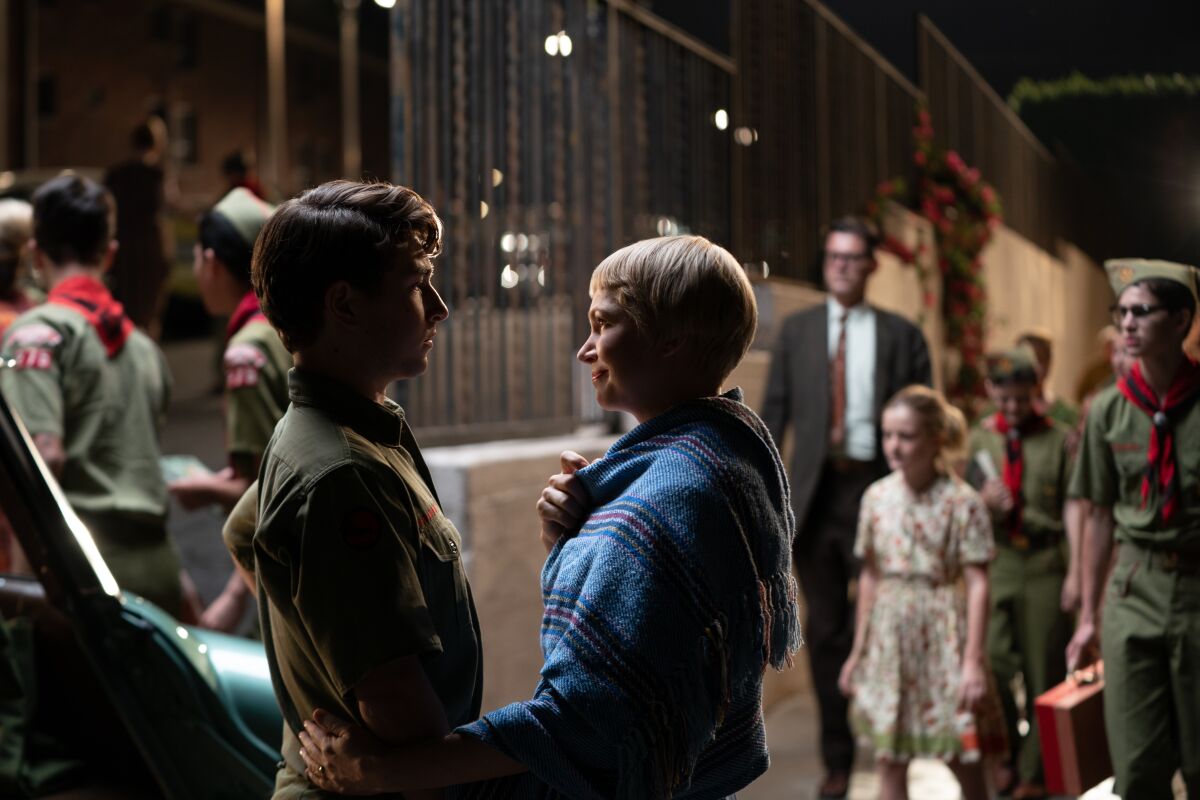
So, what’s it like playing Steven Spielberg … for Steven Spielberg?
It can be daunting enough to portray a living legend on film. But when that icon is with you every day of shooting watching your every move, well, that can invoke next-level anxiety.
But for rising young actor Gabriel LaBelle, who plays a teenage version of Steven Spielberg in the director’s semi-autobiographical drama, “The Fabelmans” (which he co-wrote with Tony Kushner), the casting coup proved more inspiring than nerve-racking. “What an opportunity and what an education it was,” enthused LaBelle, 20, of playing budding filmmaker Sammy Fabelman. The Vancouver native (and new West Hollywood resident) added, “The universe aligned in a very specific way for me to get this.”
That “education” included the chance to act alongside such heavy-hitters as Michelle Williams, Paul Dano, Seth Rogen and Judd Hirsch, who, respectively, play Sammy’s mother, father, family friend and great-uncle.
The Envelope recently spoke with the thoughtful and genial LaBelle at L.A.’s Four Seasons Hotel, amid a whirlwind stretch of interviews to promote his star-making role.
Would you say that you’re like Sammy in any ways?
I think so. We both love film and we’re both trying to dedicate our lives to it. He’s a little more obsessive than I am because he’s going to grow up to be Steven Spielberg [Laughs]. I’m not so much older than Sammy and we were both the only Jews in our town. There were Jews, but not many in my [suburban Vancouver] neighborhood or in my school at all. [Unlike Sammy] I was never bullied by it, but you’re conscious of it. We’re also both kids of divorce and … he’s going through a lot of “firsts” that I’m not so far ahead of.
What was your approach to embodying this real-life character?
There’s freedom in the fact that his name is Sammy Fabelman. Then again, everything that happens to him happened to Steven. So to understand Steven to the best of my abilities I wanted to know what story he was trying to tell in each of the characters, the tone of it all and how he felt as a person.
In terms of [duplicating his] speech, I didn’t bother because who would know what he talked like 60 years ago? And he also didn’t want that. But I wanted to emulate him physically as best I could. There’s freedom, behaviorally, if you’re not quite as conscious of being “him.” But you also don’t want to mess up his story. It’s a big responsibility to any movie, but especially for someone like [Spielberg] to open his heart and his mind out to the world like that, it’s very significant. You want to do your best.

Gabriel LaBelle says working with Michelle Williams was “something really special.”
(Merie Weismiller Wallace/Universal Pictures)
As someone who was born in 2002, how did you prepare for playing a child of the 1950s and ‘60s?
I asked Steven what movies he watched when he was that age, what inspired him. I tried to watch as many of those as I could. But the big culture change [to learn] was what it meant to be a man in the ‘50s and ‘60s, the expectations you had to be the head of a family, and the fact that nobody really got divorced back then. You tucked your shirt in, you combed your hair, you stood upright and it was a lot more formal and almost repressed.
People also weren’t that articulate with their feelings. Steven is very emotionally intuitive and so it’s difficult being that character; of feeling so much and feeling what other people around you are feeling but not being able to talk about it.
As a relative newcomer, you act here against some formidably talented and experienced actors. Talk a bit about working with Judd Hirsch in the sensational scene in which great-uncle Boris gives Sammy that torrent of life-changing advice.
[Judd’s] character is pretty much exposing Sammy. It’s the first moment where Sammy starts to feel shame that he does love this [filmmaking] more than anything. But he’s never thought about it and to realize he does is really scary and uncomfortable. For this person to just kind of look into Sammy’s brain and to show him everything he didn’t even know was there, it’s significant for the character and it’s very weird — and Judd does a great job making me feel weird! But he’s just so good, you just kind of sit there and take it.
You have so many wonderful moments opposite Michelle Williams, particularly when Sammy shows his mother the “incriminating” camping trip footage. Did you draw on anything personal in that scene?
That had to be pure imagination. That was just talking to Steven leading up to it, understanding how he felt when he did that [in real life] and then just trying to access that or create that in my head. Sammy’s been vilifying his mother for weeks and he wants her to be this villain. And then he realizes that she’s not and he starts understanding how badly she feels seeing [the camping film]. He wants to protect his mom, but then he doesn’t know where to put his anger. He’s really just trying to find out what to believe in. To be across from Michelle is something really special.
Stay connected with us on social media platform for instant update click here to join our Twitter, & Facebook
We are now on Telegram. Click here to join our channel (@TechiUpdate) and stay updated with the latest Technology headlines.
For all the latest Entertainment News Click Here
For the latest news and updates, follow us on Google News.

